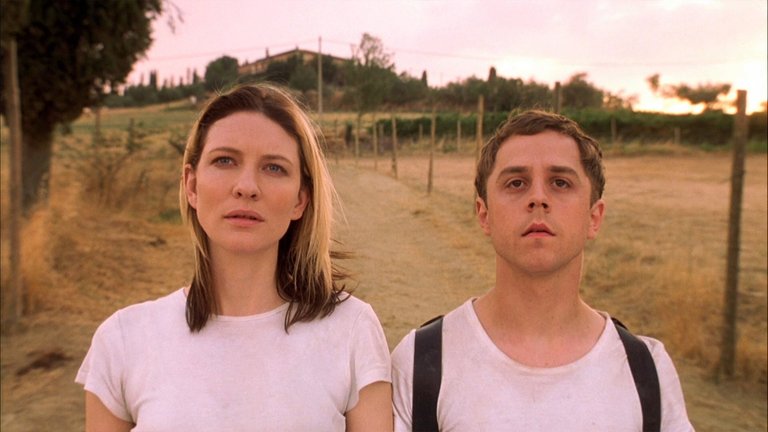
The 2002 film Heaven, directed by Tom Tykwer, is a polarising example of arthouse cinema that straddles the line between intellectual pretension and narrative failure. At the turn of the millennium, Krzysztof Kieślowski—a Polish director whose oeuvre, though relatively short, was lauded as a cornerstone of arthouse cinema—was nearing the end of his career. His 1996 retirement was widely anticipated, yet his death in the same year left three unfinished scripts for a trilogy based on Dante’s Divine Comedy. The first, Heaven, was adapted by German director Tom Tykwer, a choice that would prove to be a misstep. While Tykwer is a talented filmmaker, his decision to direct Kieślowski’s unfinished work was a critical misjudgment, as the film’s execution fails to capture the essence of its source material.
The film opens in Turin, Italy, where Filippo (Giovanni Ribisi) works as a Carabinieri clerk. His path crosses with Philippa (Cate Blanchett), an English teacher whose husband died from a drug overdose connected to a local crime lord. After failing to make the police act against him, Philippa takes matters into her own hands, planting a bomb. The explosion, however, results in a tragic accident, killing innocent people, including children. Philippa is arrested, and Filippo, the only officer at the station who can speak English, becomes her interpreter. Initially, he is complicit in her interrogation, but as he listens to her story, he begins to sympathise with her cause. He decides to help her escape custody and exact revenge on the criminals, leading the two to become fugitives and lovers who flee to the idyllic landscapes of Tuscany.
The film begins with a premise that seems ripe for a 1970s action film—vigilante justice in a gritty Italian city. However, Tykwer quickly shifts the tone, presenting a more introspective and morally ambiguous narrative. The film explores the consequences of taking justice into one’s own hands, a theme that is both compelling and cautionary. Yet, this shift is undermined by the film’s handling of its characters. Filippo’s sympathy for Philippa is central to the plot, but his decision to betray his uniform and align with her cause is a weak narrative choice. Ribisi’s portrayal of Filippo is serviceable but lacks depth, while Blanchett’s Philippa, though effective in moments, is not a memorable character. Her role, while central to the story, is undermined by the film’s overreliance on symbolic gestures, such as the two lovers shaving their heads in a futile attempt to evade detection, which ironically symbolises their perfect soulmates.
The film’s symbolism, while intended to be poetic, becomes a source of frustration. The act of head-shaving is a recurring motif, but its meaning is obscured by the film’s lack of narrative clarity. Tykwer’s attempt to imbue the story with philosophical weight is undercut by the film’s sluggish pacing. The film’s length feels unnecessarily extended, with scenes that drag on without purpose. The final scene, a quasi-poetic helicopter ascension that mirrors the film’s opening, is a dissonant conclusion that reinforces the film’s pretentious tone.
Critics hailed Heaven as a masterpiece at the Berlin Film Festival, but its reception by the general public was sparse. The film’s subject matter—a terrorist bombing—was an anachronistic choice, as the film’s release coincided with a post-9/11 global climate of heightened security and anti-terrorism sentiment. This context likely contributed to its lack of mainstream appeal.
The film’s legacy is further complicated by the fact that the trilogy was never completed. Hell, the second part, was adapted into a 2005 French film by Danis Tanović, which received mixed reviews. Purgatory, the final installment, was never produced, leaving the trilogy in a state of incomplete. This lack of resolution is a missed opportunity, as Kieślowski’s original vision would have provided a cohesive narrative that Heaven fails to achieve.
At the end of the day, Heaven is a film that reflects the contradictions of arthouse cinema. Tykwer’s direction, while technically competent, is undermined by his decision to direct a script that was never meant for his interpretation. The film’s themes are compelling, but its execution is marred by weak characterisation, overreliance on symbolism, and a pacing that prioritises pretension over narrative coherence. While it may have been a critical darling, Heaven ultimately falls short of the grandeur it aspired to, leaving a legacy that is as much a cautionary tale as it is a cultural artifact.
RATING: 3/10 (+)
Blog in Croatian https://draxblog.com
Blog in English https://draxreview.wordpress.com/
InLeo blog https://inleo.io/@drax.leo
LeoDex: https://leodex.io/?ref=drax
Hiveonboard: https://hiveonboard.com?ref=drax
InLeo: https://inleo.io/signup?referral=drax.leo
Rising Star game: https://www.risingstargame.com?referrer=drax
1Inch: https://1inch.exchange/#/r/0x83823d8CCB74F828148258BB4457642124b1328e
BTC donations: 1EWxiMiP6iiG9rger3NuUSd6HByaxQWafG
ETH donations: 0xB305F144323b99e6f8b1d66f5D7DE78B498C32A7
BCH donations: qpvxw0jax79lhmvlgcldkzpqanf03r9cjv8y6gtmk9